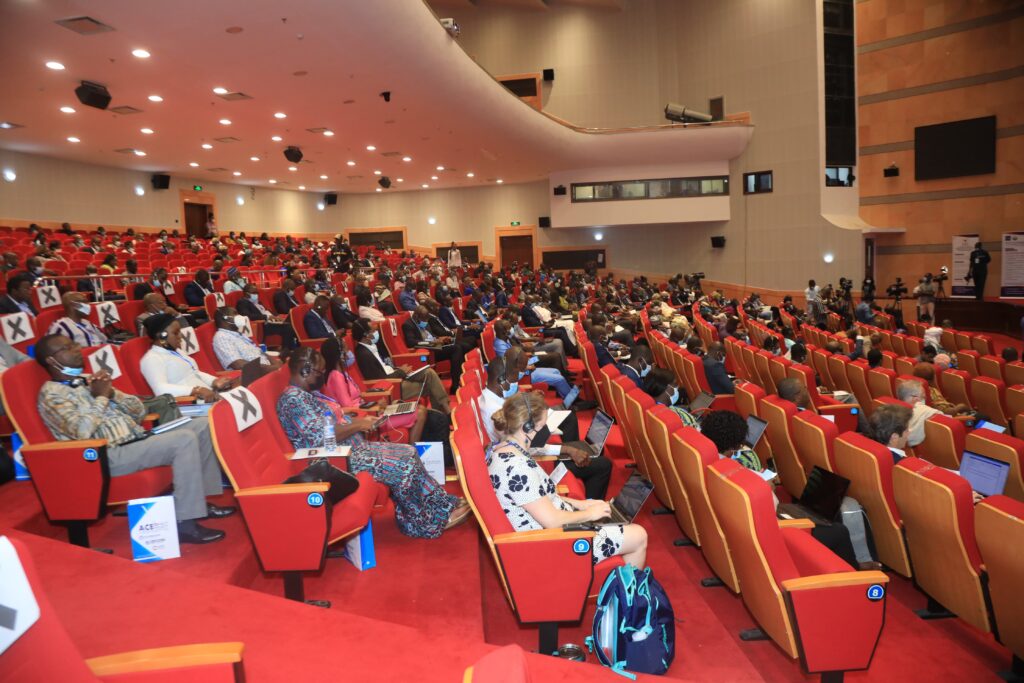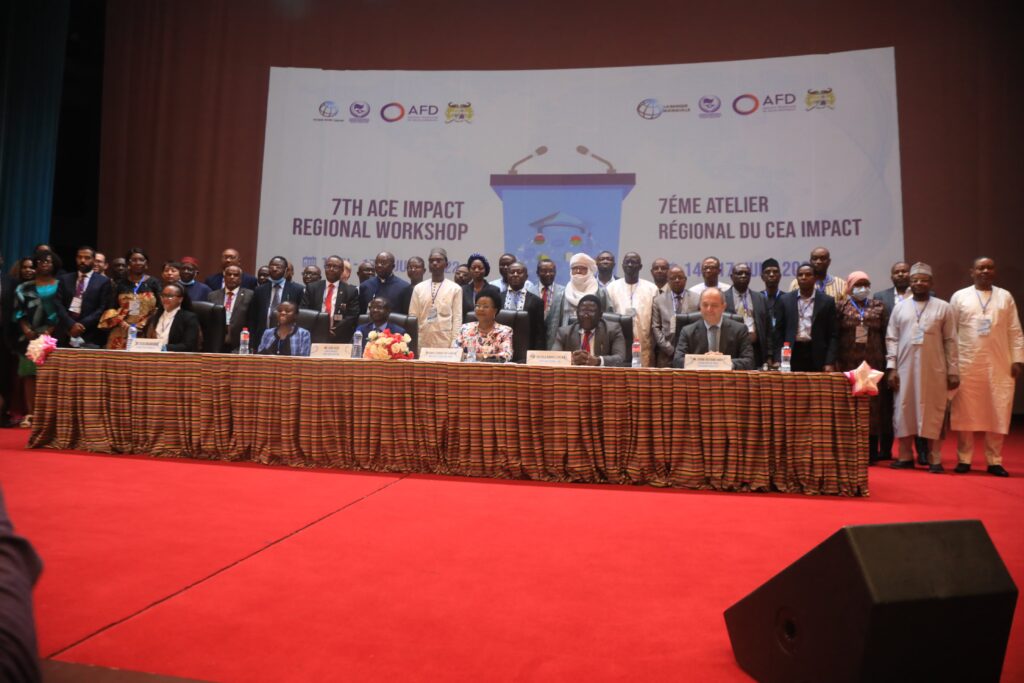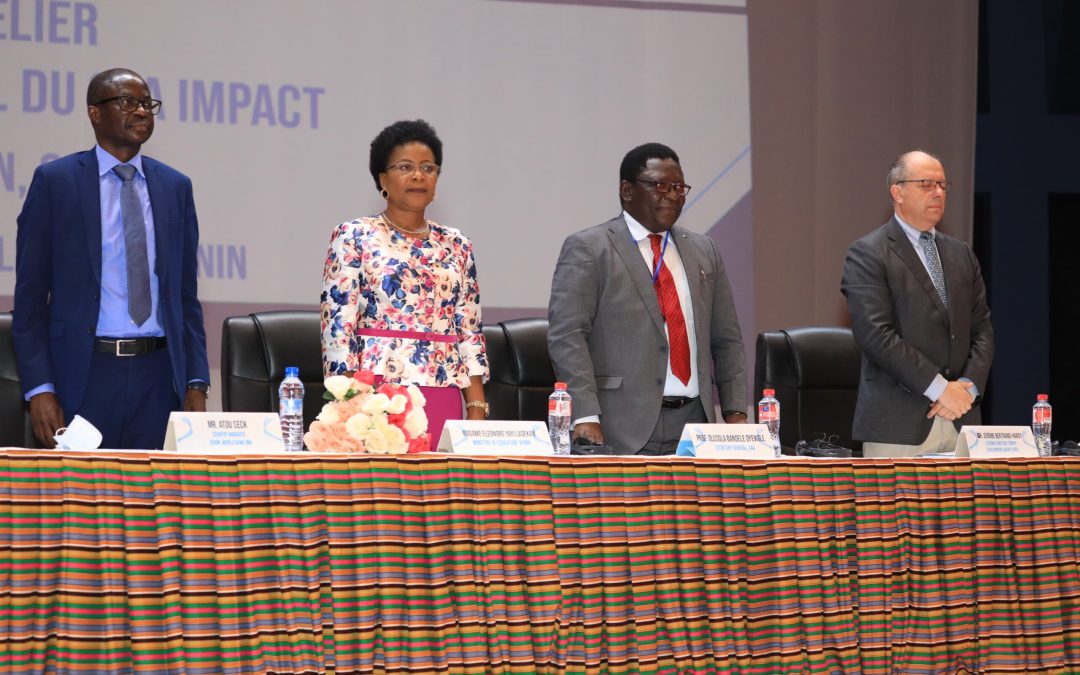Professor Mrs. Eléonore Yayi Ladekan, the Minister of Higher Education and Scientific Research of the Republic of Benin officially opened the seventh regional workshop of the Africa Higher Education Centres of Excellence Project (ACE Impact) at Palais des Congre in Cotonou Benin on the 14th June 2022. The Minister is a Professor at the University of Abomey-Calavi where she served as the Vice-Rector in charge of International Cooperation, Partnerships, & Professional Integration before her appointment as a minister in 2019. In 2015 the Benin Forum for African Women Educationalists (FAWE) recognized Mrs Eléonore Yayi Ladekan, a professor of organic chemistry, as one of the 50 most influential women scientists in Benin. Her impressive profile is inspiring for African young women and girls that aspire to also become impactful scientists.
Professor Mrs. Eléonore Yayi Ladekan paid tribute to the ACE Impact stakeholders for their impressive work towards improving the quality, quantity, and the development impact of postgraduate education in selected African universities through regional specialization and collaboration. She thanked the World Bank and the French Development Agency (AFD) for the financial resources allocated to help the nominated African Universities address regional challenges and strengthen their capacities to deliver quality training and applied research.
In her remarks she also intimated that the Government of the Republic of Benin had initiated substantial reforms in the Benin educational sector – including higher education. These reforms are aligned with the government’s 2018-2025 development plan which revolves around three priority areas that are namely structural transformation of the economy; investing in human capital; and enhancing resilience and reducing climate-related vulnerabilities. The Government of Benin is investing in human capital by increasing spending on education, providing free primary education, improving the learning infrastructure, supporting the achievement of learning outcomes, promoting digital transformation, and supporting capacity building for teachers.
The Benin Republic is hosting three Centres of Excellence at the University of Abomey Calavi and these are focusing on Science, Technology, Engineering and Mathematics (STEM). The ACE-SMIA, is a Centre of Excellence in Mathematical Sciences, Computer Science and Applications, ACE-C2EA is a Centre of Excellence in Water and Sanitation, and the College of Engineering is an emerging Centre of Excellence in Engineering.
The Africa Higher Education Centres of Excellence for Development Impact (ACE Impact) Project implementation was launched in 2018 as a follow up to the successfully implemented Africa Higher Education Centres of Excellence phase I Project (ACE 1) that was executed between 2014 and 2019. ACE Impact is a USD350 million World Bank and USD78 million French Development Agency initiative in collaboration with governments of participating countries to support 53 Centres hosted by Higher Education institutions to specialize in Science, Technology, Engineering and Mathematics (STEM), Agriculture, Social Sciences, Education, Transport, and Health in Benin, Burkina Faso, Côte d’Ivoire, Djibouti, The Gambia, Ghana, Guinea, Niger, Nigeria, Senegal and Togo. In addition, the ACE phase II of the project hosted by the Inter-University Council of East Africa covers 24 Centers across Ethiopia, Kenya, Malawi, Mozambique, Rwanda, Tanzania, Uganda, and Zambia.

The ACE Impact Project aims to strengthen the capacities of participating universities to deliver high quality training and applied research as well as meet the demand for skills required for Africa’s development. ACE Impact thematic areas also include sustainable cities; sustainable power and energy; population health and policy; herbal medicine development and regulatory sciences; public health; applied informatics and communication; and pastoral production.
The ACE Impact Project hosts two Annual Regional Workshops as a method of strengthening cross-learning, networking, and monitoring the progress of implementation. The 7th ACE Impact Regional Workshop took place at a period when the mid-term review (MTR) exercise for the Project had been completed. The MTR offered an opportunity to the 11 participating Governments, the Association of African Universities (AAU), and the 53 Centers to jointly revisit the efficacy and effectiveness of project design and implementation approach and resolve operational bottlenecks. The MTR report provided a stock taking of project progress, performance, challenges, areas of improvement and recommendations as well as highlighted lessons learned in the first two years of project implementation.
Eminent speakers during the 7th ACE Impact Regional Workshop opening ceremony included Professor Olusola Oyewole the Secretary General of the Association of African Universities (AAU), Dr Jerome Bertrand-Hardy the Cotonou Director of the French Development Agency (AFD), and Mr Atou Seck the Country Manager for the World Bank Office in Benin. Dr Sylvia Mkandawire the ACE Impact Project Manager, who is ably leading the Regional Facilitating Unit team at AAU, chaired the session of the opening ceremony.
In his well-received speech Professor Olusola Oyewole congratulated the 53 Centres of Excellence for all their hard work and dedication, which he said, “has culminated in the attainment of the key achievements that we are all proud of”. He stated that continuous collaboration among all stakeholders was critical towards ensuring the effective implementation of the ACE Impact’s Project objectives. He however cautioned that the African Countries and Universities still had a great deal to accomplish for Africa’s higher education to fully develop. Professor Oyewole called for attention to be paid towards sustaining the ACE Impact project model – and pleaded with African governments to invest towards the sustainability of this model because it holds great promise towards nurturing strengthened African Universities. Professor Oyewole pledged that the AAU would continue to support the ACE Impact Project implementation by providing robust and effective monitoring and evaluation frameworks, efficient communications, effective logistics, and experts’ support for project implementation.
Dr Jerome Bertrand-Hardy the Cotonou Director of the French Development Agency (AFD) welcomed the participants to Benin and congratulated the Centres of Excellence for the results that they had achieved in the midst of the COVID-19 pandemic. He clarified that the AFD was providing funding support to 4 Centres of Excellence in Cote d’Ivoire, Benin, and selected Centres in Nigeria.
Mr Atou Seck the Country Manager for the World Bank Office in Benin said that the World Bank was proud of the achievements made by the Centres of Excellence over the years. He referred to the results of the mid-term review that indicated that a great deal had been achieved in the areas of students’ enrollment, research publications, resource mobilization, and international accreditation of academic programs. He concluded by thanking the Association of African Universities, the 53 Centres and the participating governments for the outstanding collaborations. Mr Seck also pledged the World Bank’s continued support for the ACE Impact project.

The financing for the 53 Centres of Excellence is designed as a government programme to which the World Bank and/or AFD contribute funding. The ACE Impact project uses government and institutional budgets, agreed rules, and emphasizes the strengthening of governmental and institutional oversight for its implementation. The World Bank and/or AFD finances an agreed amount of this programme if the results are achieved, and the agreed fiduciary and safeguards rules and standards are followed. The financing contributions of the governments and institutions is the value of the estimated salaries and operational costs for the implementation of the Centres of Excellence. The amount of credit disbursements is dependent on the satisfactory achievement of agreed, pre-specified programme implementation progress and performance results, referred to as disbursement linked indicators (DLIs). Each DLI has a unit disbursement price per unit of result achieved. The reporting and verification of the achievement of the DLIs and disbursements are done periodically at agreed times. The disbursements reimburse the countries for selected expenditure of the ACE Impact project and they are referred to as Eligible Expenditure Programmes (EEPs).
Written By: Ms. Nodumo DHLAMINI, Director ICT Services, Communications & Knowledge Management at AAU

